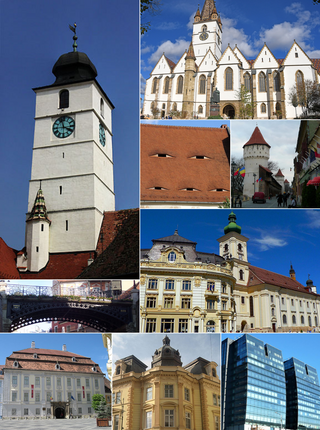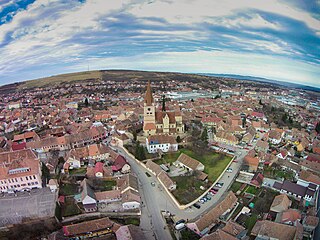
Sibiu is a city in central Romania, situated in the historical region of Transylvania. Located some 275 km (171 mi) north-west of Bucharest, the city straddles the Cibin River, a tributary of the Olt River. Now the seat of Sibiu County, between 1692 and 1791 and 1849–65 Sibiu was the capital of the Principality of Transylvania. Until 1876, the Hecht hause in Sibiu served as the seat of the Transylvanian Saxon University.

Copșa Mică is a town in Sibiu County, Transylvania, Romania, located north of Sibiu, 33 km east of Blaj, and 12 km southwest of Mediaș. It is on the route of the Via Transilvanica long-distance trail.

Cisnădie is a town in Sibiu County, Transylvania, central Romania, approximately 10 kilometres (6.2 mi) south of Sibiu. It comprises the main town of Cisnădie and one village, Cisnădioara.

Rășinari is a commune in Sibiu County, Transylvania, Romania. It has a population of 5,280 inhabitants and is composed of two villages, Prislop (Priszloptelep) and Rășinari.

The National Theatre Bucharest is one of the national theatres of Romania, located in the capital city of Bucharest.

The Bulandra Theatre in Bucharest, Romania was founded in 1947 as Teatrul Municipal; its first director was Lucia Sturdza-Bulandra, one of the leading Romanian stage actresses of her generation. Liviu Ciulei was director between 1963 and 1972; one of the most important directors since then was Ștefan Iordănescu (1999–2002), who restructured the theatre management. From 2002 until his death in 2019, the theatre was directed by Alexandru Darie; as of 2020, the director is Vlad Zamfirescu.
The State Philharmonic Orchestra of Sibiu is an orchestra from Romania.
The Artmania Festival is an art festival, held in Sibiu, a town in Romania. The festival, one of the most important projects developed by ARTmania, was first organized in the summer of 2006 and has been held every summer since.
The Copșa Mică gas field is a natural gas field located in Copșa Mică, Sibiu County, Romania. Discovered in 1915, it was developed by Romgaz, beginning production of natural gas and condensates in 1920. By 2010 the total proven reserves of the Copșa Mică gas field were around 2.77 trillion ft3 (80 km3), with a production rate of around 3.7 million ft3/day (0.1×105 m3).
The Sibiu International Theatre Festival is one of the most important theatre and performing arts festivals in the world, and the third biggest, after the Festival d'Avignon and the Edinburgh International Festival. FITS takes place in the city of Sibiu, Romania, in June every year and lasts for ten days. Founded in 1993 by Constantin Chiriac, the festival programme features renowned names of the international stage, offering spectators a broad range of sections, with guests from around 73 countries per edition, performing approximately 550 events.

The Govăjdia Blast Furnace is a disused blast furnace in Govăjdia village, Ghelari Commune, Hunedoara County, in the Transylvania region of Romania.
The following is a timeline of the history of the city of Sibiu, Transylvania, Romania.
The Radu Stanca National Theatre is a theatre in Sibiu, Romania, which began construction in 1788. It is one of the longest-standing theatres in Romania and one of the main structures that have contributed to the rise of the Sibiu International Theatre Festival. It is presently managed by Constantin Chiriac and its repertory includes performances in both Romanian and German.

The German State Theatre Timișoara is a publicly funded German-language theatre company in Timișoara, Romania, where a German-language theatre was first mentioned in 1753. The new theatre opened in 1875, but closed again in 1899 as a result of increasing Magyarization in the then Kingdom of Hungary. The ceremonial reopening of the German State Theatre Timișoara took place on 27 June 1953. The German State Theatre is located in the right wing of the Palace of Culture with entrance from Alba Iulia Street. It has a 100-seat theatre hall that it shares with the Hungarian State Theatre.
2019 was the 8th year in the history of RXF, the largest mixed martial arts promotion based in Romania.
2015 was the 4th year in the history of RXF, the largest mixed martial arts promotion based in Romania.
2014 was the 3rd year in the history of RXF, the largest mixed martial arts promotion based in Romania.

The Palace of Culture is an emblematic building in Timișoara, Romania. It hosts a number of cultural institutions, including the Romanian National Opera, the Mihai Eminescu National Theatre, the Csiky Gergely Hungarian State Theatre and the German State Theatre. On 31 October 1918, the unification of Banat and Romania was agreed upon in the Kronprinz Rudolf restaurant, located on the ground floor, by a group led by Aurel Cosma. On 20 December 1989, during the Romanian Revolution, the Democratic Romanian Front was founded in the Palace of Culture and Timișoara was declared free from communism. The building is a historical monument of national importance, listed under LMI code TM-II-m-A-06118. It occupies the northern side of Victory Square and is one of the main landmarks of the city.
The Old Theatre of Arad or Hirschl Theatre is a building declared a historical monument located on Gheorghe Lazăr Street, in Arad municipality and is the first permanent theatre building in Romania, built in 1817.
Thalia Hall may refer to:










